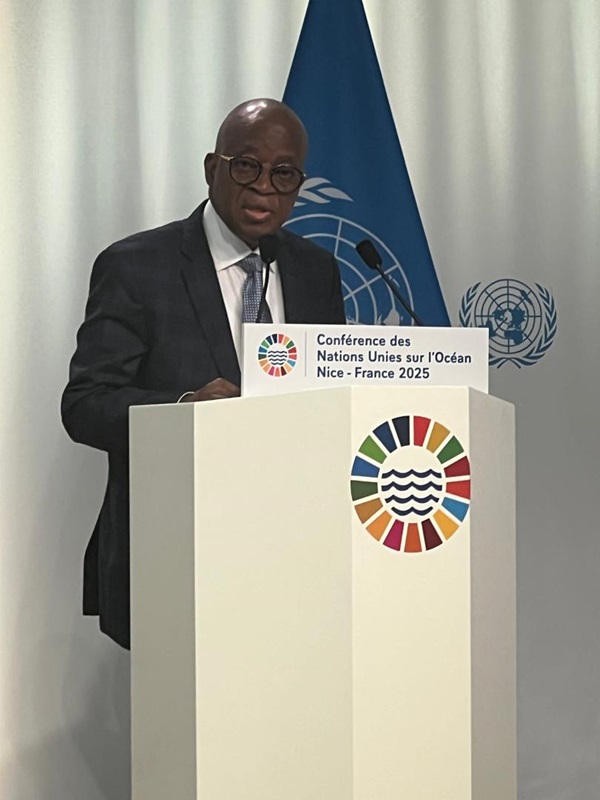
At the ongoing United Nations Ocean Conference in Nice, France, Nigeria has issued a strong call for the immediate ratification of the Biodiversity Beyond National Jurisdiction (BBNJ) Agreement and significantly increased funding for blue economy initiatives to safeguard the world’s oceans and promote their sustainable use.
Delivering Nigeria’s national statement on behalf of President Bola Tinubu, GCFR, the Minister of Marine and Blue Economy, Adegboyega Oyetola, CON, stressed that urgent and coordinated global action is essential to secure the long-term health of marine ecosystems for future generations.
The conference, co-hosted by France and Costa Rica, has attracted over 120 member states and is being held under the theme “Accelerating Action and Mobilising All Actors to Conserve and Sustainably Use the Ocean.”
In his address, Oyetola noted that as a coastal state, Nigeria sees the ocean not only as a source of immense natural wealth but also as a foundation for global food security, employment generation and sustainable livelihoods. He reaffirmed Nigeria’s dedication to achieving the goals of Sustainable Development Goal 14, the African Union Agenda 2063 and the Kunming-Montreal Global Biodiversity Framework.
He announced that Nigeria has signed the BBNJ Agreement and initiated its ratification process. He underscored that the successful implementation of the agreement, including the designation of at least 30 percent of global ocean space as Marine Protected Areas by 2030, is crucial to achieving SDG 14. However, he cautioned that reaching these targets requires a collective commitment to robust monitoring systems and enforcement mechanisms.
Demonstrating regional leadership, the minister revealed that Nigeria has led West African efforts to validate a regional roadmap for establishing a High Seas Marine Protected Area in the convergence zone of the Canary and Guinea Currents.
He expressed Nigeria’s full support for the adoption of the draft Nice Ocean Action Declaration and Plan and called on the international community, particularly investors and development partners, to mobilise both technical expertise and financial assistance to bolster blue economy programmes in developing countries. He emphasised that blue finance and marine science transfer are essential to improving policy frameworks and developing sustainable ocean-based industries.
Highlighting Nigeria’s domestic efforts, Oyetola outlined several initiatives currently underway to strengthen ocean governance. These include the National Blue Economy Policy, which aims to promote responsible investment in ocean-based sectors; the development of a national roadmap for the ratification and implementation of the BBNJ Treaty; a revised National Biodiversity Strategy and Action Plan aligned with international conservation goals; and a National Policy on Marine Plastic Pollution aimed at addressing land-based sources of marine waste.
In addition, he noted Nigeria’s progress in conducting hydrographic surveys and implementing modern charting systems to improve maritime safety in the Gulf of Guinea. He further highlighted Nigeria’s resolve to address cross-border marine threats such as illegal, unreported and unregulated fishing, marine dumping and ocean resource mismanagement. He called for better regional cooperation, enhanced data collection, and improved ocean monitoring capabilities to address these complex challenges.
Reiterating Nigeria’s dedication to multilateral ocean agreements, Oyetola urged world leaders to take bold, coordinated steps to preserve ocean health and prioritize SDG 14. He emphasised that the ratification of the BBNJ Agreement and increased investment in the blue economy must be supported by political will, scientific guidance and international collaboration. Nigeria, he affirmed, is committed to working with global partners to promote shared ocean goals and sustainable marine futures.
The urgency of Nigeria’s message resonated with other world leaders at the conference. United Nations Secretary-General António Guterres warned that the world’s oceans are under extraordinary pressure. He cited rising sea temperatures, acidification, overfishing and plastic pollution as major threats, noting that oceans absorb 90 percent of the excess heat generated by greenhouse gas emissions.
Nigeria’s delegation to the conference includes top government officials and maritime sector leaders. Among them are the permanent secretary of the Federal Ministry of Marine and Blue Economy, Olufemi Oloruntola; Director-general of the Nigerian Maritime Administration and Safety Agency (NIMASA), Dr. Dayo Mobereola; Managing director of the National Inland Waterways Authority (NIWA), Asiwaju Bola Oyebamiji; Director of maritime safety and security, Babatunde Bombata and the director of fisheries, Wellington Omoragbon.
Nigeria’s clear and firm message at the United Nations Ocean Conference highlights the country’s growing leadership in ocean governance and its commitment to protecting marine biodiversity through inclusive, well-funded and collaborative global action.

